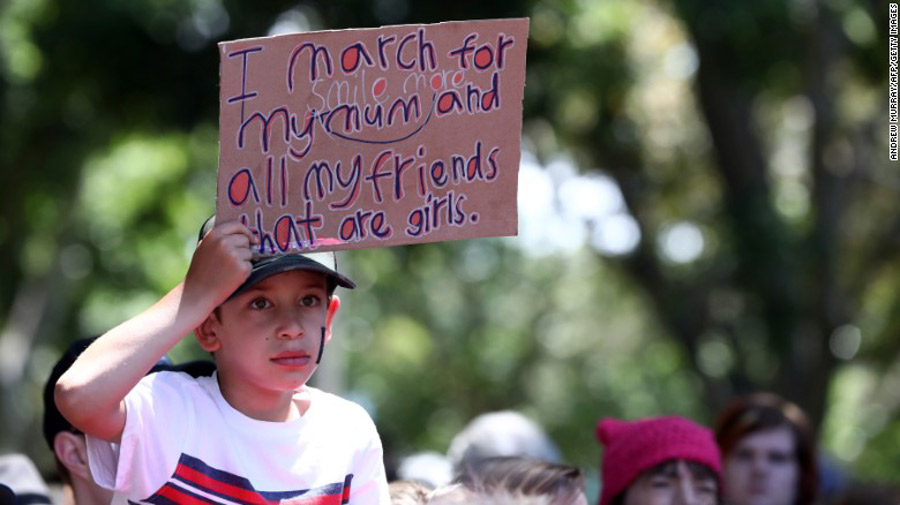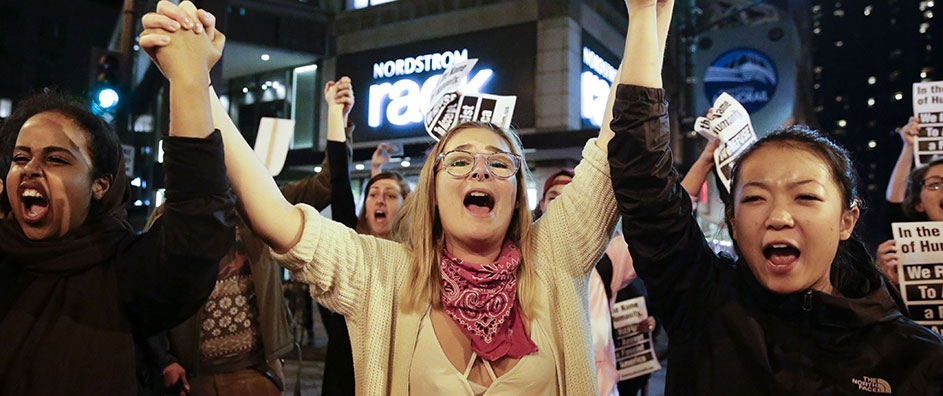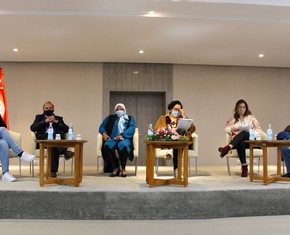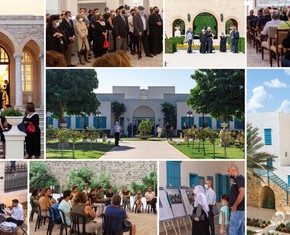The views expressed in our content reflect individual perspectives and do not represent the authoritative views of the Baha'i Faith.
All across the United States and the world, women of many diverse ages and backgrounds marched in solidarity for human rights and justice on January 21, 2017.
Proclaimed the largest mass demonstration in history, the march had as its impetus a plethora of human rights concerns, as well as a number of protest causes. A total of 670 marches around the world in an estimated 30 countries occurred, in cities including Sydney, Berlin, London, Paris, Mexico City, Nairobi, and Cape Town, and of course, all across the United States. Even in Antarctica a pro-peace, pro-environment march happened. For the first time in human history, activists, advocates and regular folks marched on all seven of the Earth’s continents.
In Sydney, Australia, one young boy held a sign: “I march for my mum and all my friends who are girls.” Chants at the marches included words such as “Women united will never be defeated.” Marchers in Cape Town, South Africa carried banners with slogans such as “Climate change is a woman’s issue.” In Rome, there was the reminder: “Women’s rights are human rights.”

In the future, January 21, 2017 may be considered an historical milestone in the evolution of human society, as was the 1848 women’s rights convention in Seneca Falls, New York or the 1963 March on Washington led by Dr. Martin Luther King, Jr.
For me, the most significant aspect of the women’s march involved women arising to claim their equality and power—peacefully, collectively, and proactively. This transcended culture, political stance, race, age, economic status, religion, moral attitudes, and even gender—as men and children also participated. Women took their young sons, men brought their daughters. At last! I thought, as I surveyed the many photos taken from around the world of the marches in various localities—and marveled.
The Baha’i writings, since the mid 1800s, have called for gender equality. They’ve also pointed out the clear relationship of equality—and leadership by women—to world peace:
In past ages humanity has been defective and inefficient because it has been incomplete. War and its ravages have blighted the world; the education of woman will be a mighty step toward its abolition and ending, for she will use her whole influence against war. Woman rears the child and educates the youth to maturity. She will refuse to give her sons for sacrifice upon the field of battle. In truth, she will be the greatest factor in establishing universal peace and international arbitration. Assuredly, woman will abolish warfare among mankind. Inasmuch as human society consists of two parts, the male and female, each the complement of the other, the happiness and stability of humanity cannot be assured unless both are perfected. Therefore, the standard and status of man and woman must become equalized. – Abdu’l-Baha, The Promulgation of Universal Peace, p. 108.
… among the teachings of Baha’u’llah is the equality of women and men. The world of humanity has two wings—one is women and the other men. Not until both wings are equally developed can the bird fly. Should one wing remain weak, flight is impossible. – Abdu’l-Baha, Selections from the Writings of Abdu’l-Baha, p. 302.
Women have equal rights with men upon earth; in religion and society they are a very important element. As long as women are prevented from attaining their highest possibilities, so long will men be unable to achieve the greatness which might be theirs. – Abdu’l-Baha, Paris Talks, p. 133.
Until the reality of equality between man and woman is fully established and attained, the highest social development of mankind is not possible …. In brief, the assumption of superiority by man will continue to be depressing to the ambition of woman, as if her attainment to equality was creationally impossible; woman’s aspiration toward advancement will be checked by it, and she will gradually become hopeless. On the contrary, we must declare that her capacity is equal, even greater than man’s. This will inspire her with hope and ambition, and her susceptibilities for advancement will continually increase. – Abdu’l-Baha, The Promulgation of Universal Peace, p. 76.
We must, Baha’is believe, allow women to take their place as full partners “in all fields of human endeavor:”
The emancipation of women, the achievement of full equality between the sexes, is one of the most important, though less acknowledged pre-requisites of peace. The denial of such equality perpetrates an injustice against one half of the world’s population and promotes in men harmful attitudes and habits that are carried from the family to the workplace, to political life, and ultimately to international relations. There are no grounds, moral, practical, or biological, upon which such denial can be justified. Only as women are welcomed into full partnership in all fields of human endeavor will the moral and psychological climate be created in which international peace can emerge. – The Universal House of Justice, The Promise of World Peace, October 1985, p. 3.
In light of all of the statements above, we can already see the historic significance of the women’s march. How and when full equality will be achieved, how and when women will lead the way to peace—these things are mysterious and perhaps beyond our current level of understanding. But the marches are surely a harbinger of realities to unfold.
Baha’is have committed themselves to a positive vision of the future, and a system of governance that will in time become worldwide, consultative rather than hierarchical in nature, and concerned with the protection and flourishing of all people. This means that rather than tear down current administrations or governments, the global Baha’i community works toward building a whole new system that emphasizes justice, peace and oneness.
Women, Baha’is believe, will play a large role in this transformative process. Whether unified in vision or not, whether representing attitudes that coalesce or contrast with each other, women worldwide are waking up to their full potential.
It serves us all to listen to this collective clamoring and to see it as a hopeful and evolutionary sign for humanity on our path to a lasting and sustainable peace.
















Comments
Sign in or create an account
Continue with Googleor